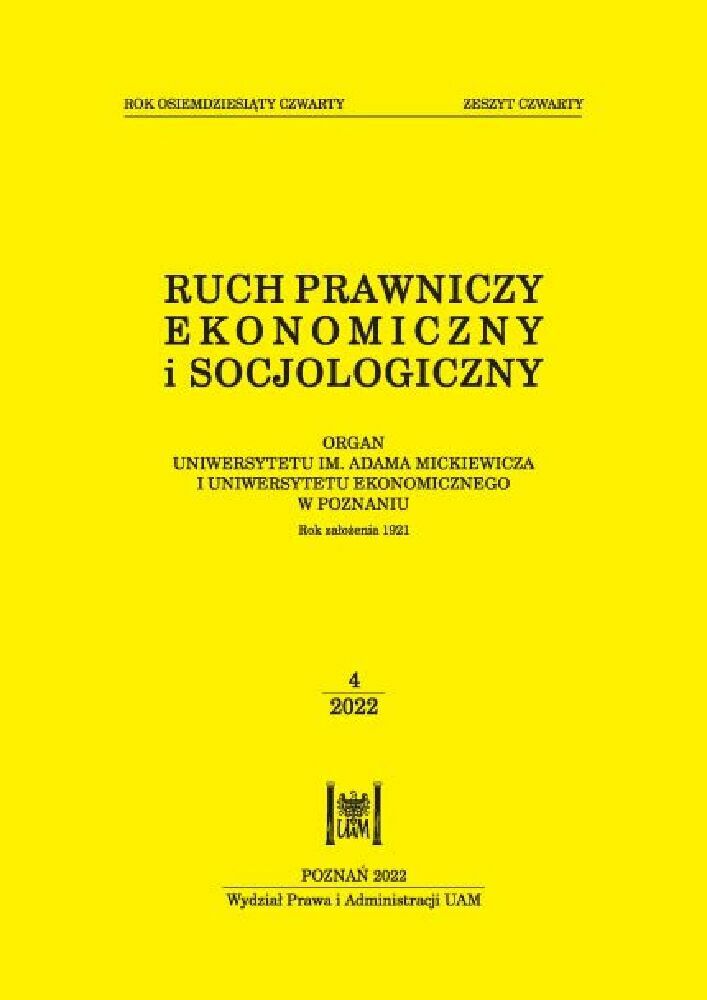Abstract
The aim of the article is to reconstruct and interpret how teachers coped with new challenges in their work during the COVID-19 pandemic. The research focuses on the social experience of teachers’ work in this crisis period. The text presents a thematic analysis of the material from qualitative interviews focused on the most important aspects of teachers’ experience at work following the introduction of remote work in education on a large scale. The analysis of the research material (three focus interviews and six autobiographical narrative interviews) runs concurrently with the presentation of the topics emerging from the review of literature relevant to the subject. The thematic analysis focuses on how teachers coped during the pandemic and the experience of crises in their professional and personal life. In the conclusion, we name and pre-categorize teachers’ strategies for coping with the challenges of teaching during the pandemic following the introduction of remote work in an emergency mode without institutional preparation. The results presented in the article are part of the research conducted under the currently implemented research project COV-WORK.
Funding
National Science Centre (Poland)
References
Adediran, T. (2020). Impact of COVID 19 and Online Learning on Education in UK. <https://www.researchgate.net/publication/347442597_Impact_of_COVID_19_and_Online_Learning_on_Education_in_UK>.
Archer, M. (2007). Making our Way Through the World: Human Reflexivity and Social Mobility. Cambridge: Cambridge University Press. https://doi.org/10.1017/CBO9780511618932 DOI: https://doi.org/10.1017/CBO9780511618932
Barron Rodriguez, M., Cobo, C., Munoz-Najar, A., Sanchez C. (2021). Remote Learning During the Global School Lockdown: Multi-Country Lessons. World Bank, Washington, DC. <https://openknowledge.worldbank.org/handle/10986/36141>. doi: https://doi.org/10.1596/36141 DOI: https://doi.org/10.1596/36141
Buchner, A., Majchrzak, M., Wierzbicka, M. (2020). Edukacja zdalna w czasie pandemii. Raport z badań. Warszawa: Centrum Cyfrowe. .
Di Pietro, G., Biagi, F., Costa, P., Karpiński Z., Mazza, J. (2020). The likely impact of COVID-19 on education: reflections based on the existing literature and international datasets. Luxembourg: Publications Office of the European Union. doi: https://doi.org/10.2760/126686, JRC121071
Dynowska-Chmielewska, K., Cieślik, Ł., Sekścińska, K., Trzcińska, A., Gurba, K., Lackowski, J., Długosz, P., Dankiewicz-Berger, M., Muchacki, M. (2020). Raport z badania: "Kształcenie na odległość oczami dyrektorów szkół, nauczycieli, uczniów i rodziców. Warszawa-Kraków: Centrum Polityk Publicznych.
Gądecki, J. (2020). Perspektywy rozwoju pracy zdalnej w Pomorskiem - nowe modele pracy oraz wyzwania i potrzeby pracodawców i pracowników. Gdańsk: PORP.
Glaser, B. (1978). Theoretical Sensitivity: Advances in the Methodology of Grounded Theory. Mill Valley: Sociology Press.
Ibrahim, A., Al-Kaabi, A., El-Zaatari, W. (2013). Teacher resistance to educational change in the United Arab Emirates. International Journal of Research Studies in Education 2(3): 25-36. doi: https://doi.org/10.5861/ijrse.2013.254 DOI: https://doi.org/10.5861/ijrse.2013.254
Jelińska, M., Paradowski, M.B. (2021). Teachers' engagement in and coping with emergency remote instruction during COVID-19-induced school closures: a multinational contextual perspective. Online Learning Journal 25(1): 303-328. doi: https://doi.org/10.24059/olj.v25i1.2492 DOI: https://doi.org/10.24059/olj.v25i1.2492
Jimoyiannis, A., Koukis, N., Tsiotakis, P. (2021). Shifting to emergency remote teaching due to the COVID-19 pandemic: Greek teachers' beliefs and experiences, [w:] A. Reis, J. Barroso, J.B. Lopes, T. Mikropoulos, C.-W. Fan (eds.), Technology and Innovation in Learning, Teaching and Education (320-329). Cham, Switzerland: Springer. doi: https://doi.org/10.1007/978-3-030-73988-1_25 DOI: https://doi.org/10.1007/978-3-030-73988-1_25
Kaźmierska, K., Schütze, F. (2013). Wykorzystanie autobiograficznego wywiadu narracyjnego w badaniach nad konstruowaniem obrazu przeszłości w biografii. Na przykładzie socjologicznego porównania narracji na temat życia w PRL-u i NRD. Przegląd Socjologii Jakościowej 9(4): 22-138. doi: https://doi.org/10.18778/1733-8069.9.4.08 DOI: https://doi.org/10.18778/1733-8069.9.4.08
Krasowska, A., Drabina-Różewicz, A. (2017). Biographical experience of work by young precarious workers in Poland. Warsaw Forum of Economic Sociology 8(1): 33-50.
Kutrowska, B. (2008). Spojrzenie na rolę nauczyciela z perspektywy rożnych oczekiwań społecznych, [w:] P. Rudnicki, B. Kutrowska, M. Nowak-Dziemianowicz (red.), Nauczyciel: misja czy zawód? Społeczne i profesjonalne aspekty roli (49-60). Wrocław: Wydawnictwo Naukowe Dolnośląskiej Szkoły Wyższej.
Margolis, J., Nagel, L. (2006). Education reform and the role of administrators in mediating teacher stress. Teacher Education Quarterly 33(4): 143-159.
Mean, B., Neisler, J. (with Langer Research Associates) (2020). Suddenly Online: A National Survey of Undergraduates during the COVID-19 Pandemic. <https://digitalpromise.org/wp--content/uploads/2020/07/ELE_CoBrand_DP_FINAL_3.pdf>. doi: https://doi.org/10.51388/20.500.12265/98 DOI: https://doi.org/10.51388/20.500.12265/98
Padilla Rodríguez, B.C., Armellini, A., Traxler, J. (2021). The forgotten ones: how rural teachers in Mexico are facing the COVID-19 pandemic. Online Learning 25(1): 253-268. doi: https://doi.org/10.24059/olj.v25i1.2453 DOI: https://doi.org/10.24059/olj.v25i1.2453
Peñarrubia-Lozano, C., Segura-Berges, M., Lizalde-Gil, M., Bustamante, J.C. (2021). A qualitative analysis of implementing e-learning during the COVID-19 lockdown. Sustainability 13(6): 17-33. doi: https://doi.org/10.3390/su13063317 DOI: https://doi.org/10.3390/su13063317
Plebańska, M., Szyller, A., Sieńczewska, M. (2020). Edukacja zdalna w czasach COVID-19. Raport z badania. Warszawa: Wydział Pedagogiczny UW. <https://kometa.edu.pl/uploads/publication/941/24a2_A_a_nauczanie_zdalne_oczami_nauczycieli_i_uczniow_RAPORT.pdf?v2.8>.
Ptaszek, G., Stunża, G.D., Pyżalski, J., Dębski, M., Bigaj, M. (2020). Edukacja zdalna: co stało się z uczniami, ich rodzicami i nauczycielami? Gdańsk: Gdańskie Wydawnictwo Psychologiczne.
Schütze, F. (2012). Analiza biograficzna ugruntowana empirycznie w autobiograficznym wywiadzie narracyjnym. Jak analizować autobiograficzne wywiady narracyjne, [w:] K. Kaźmierska (red.), Metoda biograficzna w socjologii. Antologia tekstów (141-278). Kraków: Nomos.
Strauss, A.L. (1987). Qualitative Analysis for Social Scientists. Cambridge: Cambridge University Press. doi: https://doi.org/10.1017/CBO9780511557842 DOI: https://doi.org/10.1017/CBO9780511557842
Strauss, A.L. (1991). A personal history of the development of grounded theory, qualitative family research. A Newsletter of the Qualitative Family Research Network 5(2): 837-857.
Swidler, A. (1986). Culture in action: symbols and strategies. American Sociological Review 51: 273-286. doi: https://doi.org/10.2307/2095521 DOI: https://doi.org/10.2307/2095521
Tiejun, Z. (2020). Empirical research on the application of online teaching in Chinese colleges and universities under the situation of novel coronavirus pneumonia prevention and control. International Journal of Emerging Technologies in Learning 15(11): 119-136. doi:10.3991/IJET.V15I11.13935 doi: https://doi.org/10.3991/ijet.v15i11.13935 DOI: https://doi.org/10.3991/ijet.v15i11.13935
Turska-Kawa, A., Stępień-Lampa, N., Grzywna, P. (2020). Obawy rodziców i nauczycieli wobec nowych form edukacji w okresie pandemii SARS-COV-2. Studium województwa śląskiego - Raport Pro Silesia. doi:10.13140/RG.2.2.27224.32004
Waniek, K. (2016). Potencjały bezładu i cierpienia w biografiach młodych kobiet wchodzących w świat sztuki i medycyny. Przegląd Socjologii Jakościowej 12(2): 114-144. doi: https://doi.org/10.18778/1733-8069.12.2.07 DOI: https://doi.org/10.18778/1733-8069.12.2.07
Waniek, K. (2019). The precarious life situation trap: the case of "zealous" Julia - a proponent and a victim of neoliberal reality. Qualitative Sociology Review 15(4): 164-193. doi: https://doi.org/10.18778/1733-8077.15.4.08 DOI: https://doi.org/10.18778/1733-8077.15.4.08
Zahorska, M. (2020). Sukces czy porażka zdalnego nauczania? Fundacja Batorego. Forum Idei. <https://www.batory.org.pl/wp-content/uploads/2020/09/Sukces-czy-porazka-zdalnego-nauczania.pdf?msclkid=4cf340dbcfa111ec99401d3939177ad8>.
Ziółkowski, P. (2021). Strajk nauczycieli w 2019 r. Zeszyty Naukowe Wyższej Szkoły Gospodarki. Edukacja - Rodzina - Społeczeństwo 5: 245-269.
License
Copyright (c) 2022 WPiA UAM

This work is licensed under a Creative Commons Attribution-NonCommercial-NoDerivatives 4.0 International License.





